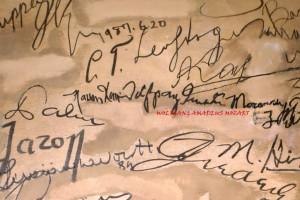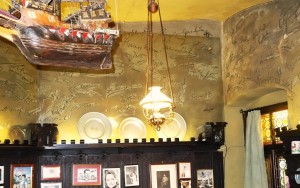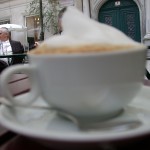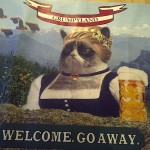IF THE WALLS COULD SPEAK – A SCHNITZEL WITH TURKISH INVADERS, BEETHOVEN, TWAIN AND JOHNNY CASH
Eating and sleeping are the only activities that should be allowed to interrupt a man’s enjoyment of his cigar. – Mark Twain
 Nestled amongst the cobblestones of the Vienna’s 1st district, beside the beautifully orange- and gold-tiled Greek Orthodox Church, is Vienna’s oldest tavern. 1350 (a whopping 665 years ago!) is the first documented date that the building is mentioned in Vienna city records when the place belonged to a knight commoner (yep – even knight status apparently has its hierarchies) by the name of Lienhart Poll. As early as 1447, the building was first used as a tavern which was named “Zum Gelben Adler” (To the Yellow Eagle).
Nestled amongst the cobblestones of the Vienna’s 1st district, beside the beautifully orange- and gold-tiled Greek Orthodox Church, is Vienna’s oldest tavern. 1350 (a whopping 665 years ago!) is the first documented date that the building is mentioned in Vienna city records when the place belonged to a knight commoner (yep – even knight status apparently has its hierarchies) by the name of Lienhart Poll. As early as 1447, the building was first used as a tavern which was named “Zum Gelben Adler” (To the Yellow Eagle).
Now let’s just stop here for a moment to appreciate the age of this place. The good old US of A is a
mere bubbling 239 years old. This place is almost 3 times older than that. Imagine! I know I’m a sucker for nostalgic tales but how can anyone resist wondering about the musings, confessions, sweet nothings, inspirations, gripes and debates these walls have witnessed while sheltering those who have passed through its doors from the harsh elements of fires, plagues, wars, and weather. Isn’t it cool to imagine?
Translated, the name “Griechenbeisl” means “Greek Tavern” but the Zwiebelrostbraten, Wiener Schnitzel and Tafelspitz you’ll find on the menu are all true Viennese specialties and have nothing to do with Greek food. The Greek in the tavern name refers to the Greek traders and merchants who liked to dine here in the 1800s.
The house came under attack twice when Turkish invaders attempted to seize Vienna (1529 and 1683). A remnant is still visible inside the tavern — a cannonball from 1529 which was unearthed during renovation work in 1960 and remains stuck in the wall near the stairway at the entrance.
Over the centuries, the tavern has expanded and along with it, the amount of rooms. Today there are eight dining rooms, each preserved in a different era and style. My personal favorite is the Twain room which you can request when making reservations (always make reservations before coming) but can be difficult to score since it is often reserved for private parties. The room is considered a historical monument and the ceiling is filled with the signatures of all the famous folks who have dined and drank within the walls. If you don’t land a lucky table in this amazing room, kindly ask your waiter if it is possible to have a look in. The waiters have long sticks that they can use to point out some of the better known guests. Historic guests include Beethoven, Mark Twain, Schubert, Wagner, Strauss, Count Zeppelin, Mozart, and Brahms to name a few. Then you have the more recent “promis” and these include, amongst others, Johnny Cash, Pavarotti, Barry Manilow, and Phil Colins.
The guy who seems to be sleeping off his hangover in a cage in the floor at the entrance isn’t some sorry sap who failed to pay his beer tab. Well, then again, maybe he is. But if you pause and listen, you might hear him whistling the song written in his honor and since sung by beer-mug-swinging admirers for decades– “Oh du lieber Augustin.” Supposedly he (Marx Augustin) sang and drank here in 1679. But he became famous because he was so intoxicated that when he fell into the pit dug out for the city’s plague victims, he simply made himself cozy and slept off his hangover (and you thought you woke up in some shocking places the morning after). We all know the amazing clensing powers inherent in an Austrian apricot Schnapps, so it shouldn’t come as a surprise that good old Marx climbed out of the grave the next day and was fit for another round (and I’m not talking about the row-row-row-your-boat musical kind).
A meal in the Griechenbeisl will set you back — just for the main course — anywhere between 17 and 28 € depending on what you order. Granted, not cheap but this is no fast food joint and they do take plastic. Waiters decked out in suits and bow ties who can switch languages in a blink of an eye and actually correctly serve your Zweigelt in a decanter are bound to send your date’s heart aflutter. The menu is in German and English and you might even get some live music accompaniment from a zither for your meal (if you really want to show what a good guy you are, discreetly tip the zither player as you leave). The wine cellar is currently being renovated and sometime later this year, the restaurant plans to host wine tasting events. This isn’t Applebees or The Cheesecake Factory so leave your shorts and tennis shoes at home. Dressy casual is fine here but don’t expect to eat and run. Have an appetizer, have a Grüner Veltliner or Zweigelt, a Melange, a Schnapps and some very good Viennese food and then sit back and listen to the rustic tales of history and whisper to the walls some new ones of your own.
“Street” scene from a recent visit to the Griechenbeisl:
Conversation at a neighboring table filled with no less than ten older refined gentlemen and not one single lady.
Waiter: Ah! A round of just gentlemen!
One of the guests from the table: laughing Indeed! Tonight we left the ladies at home.
Waiter: I don’t believe a word of it. Tell the truth. You guys all got kicked out. 
Griechenbeisl: Fleischmarkt 11, 1010 Vienna (subway: U4 or U1 to Schwedenplatz)
Open daily from 11 am – 1 am (food service: 11:30 am – 11:30 pm)
Definitely call and reserve a table and try to score the Mark Twain room: +43 1 533 19 77















